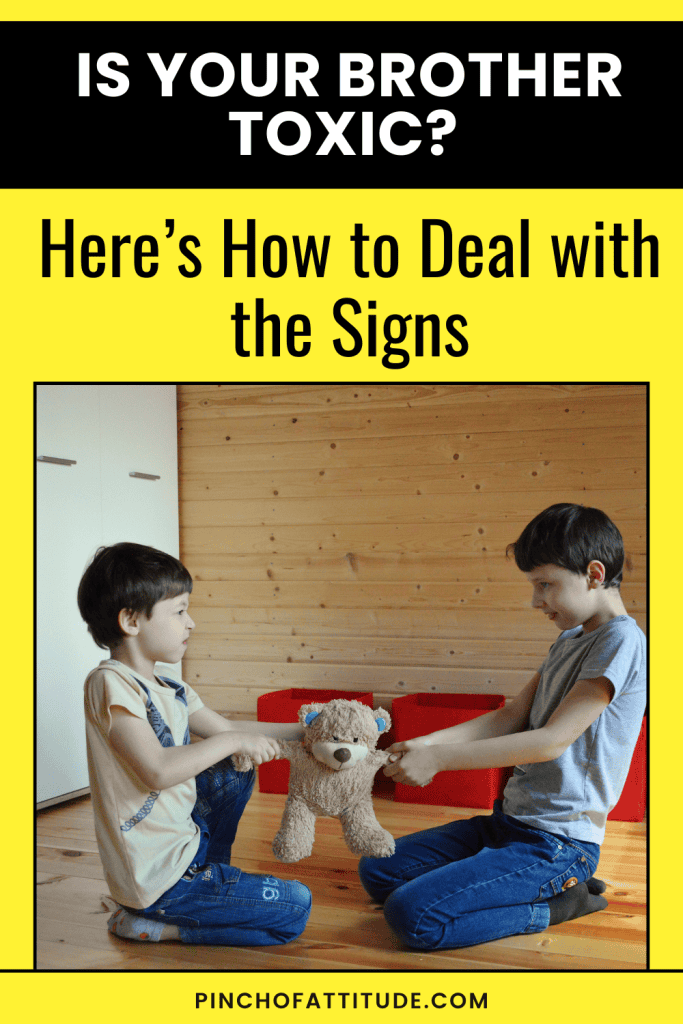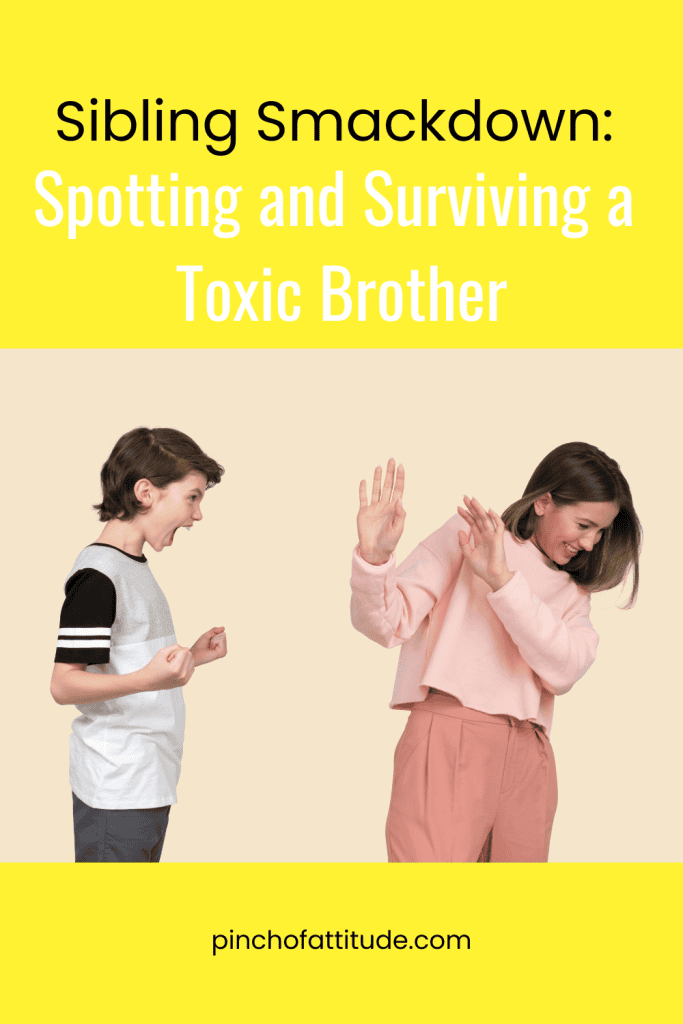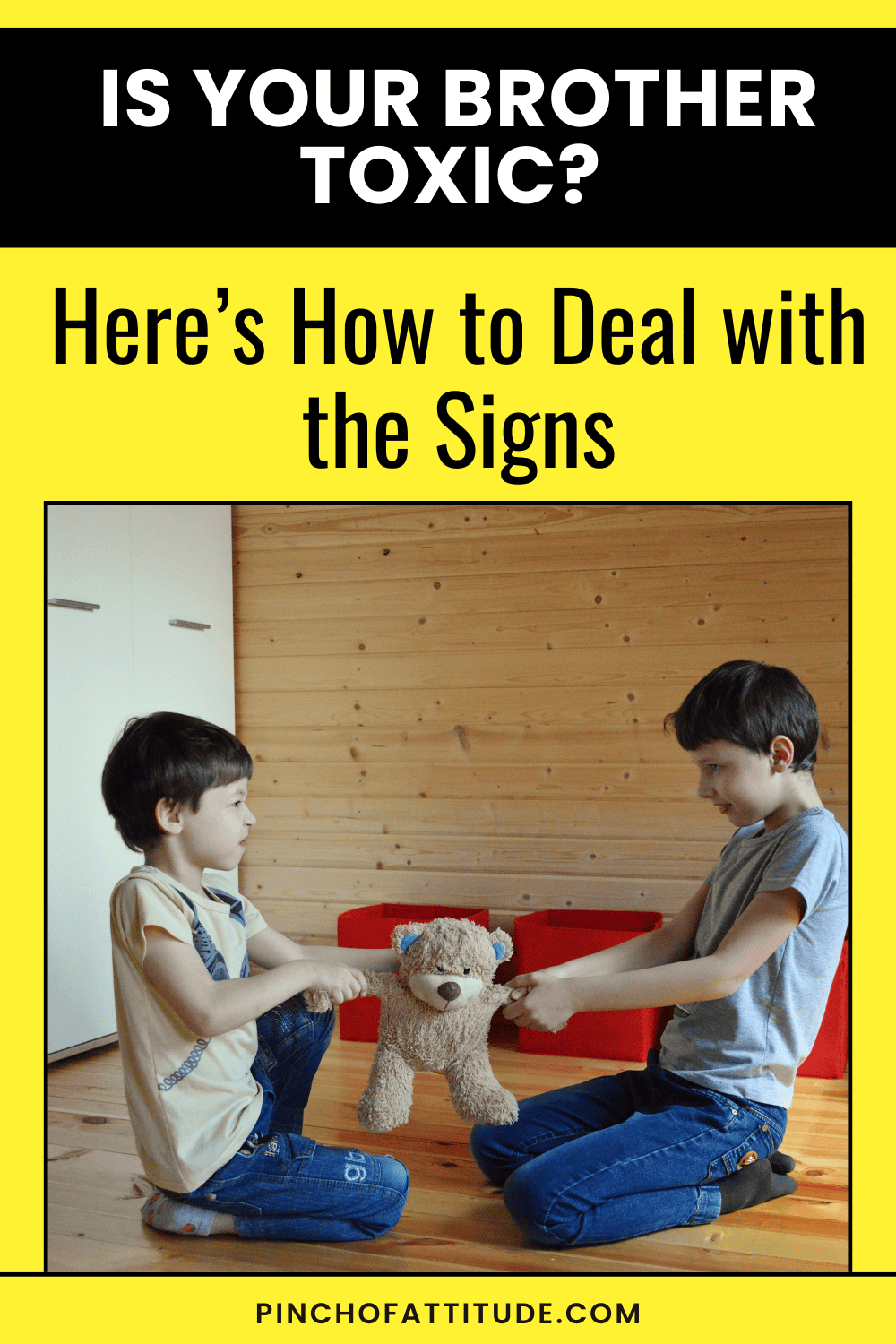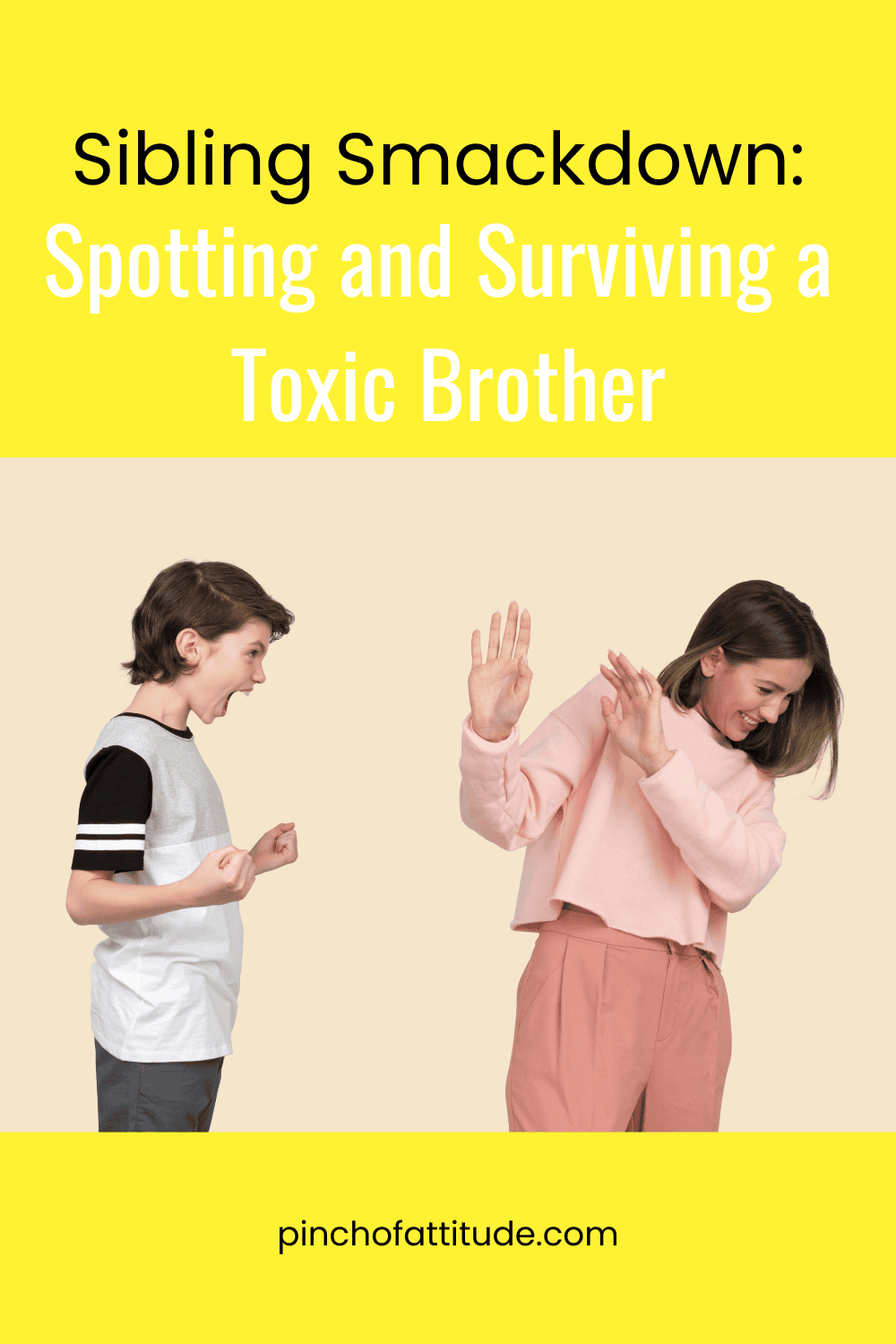We’ve all seen it in movies – the constant jabs, the competition that feels less playful and more like a bloodsport. But sometimes, that on-screen drama bleeds into real life.
Yep, I’m talking about toxic brother relationships. In my case, it was my younger sibling.
Growing up, I never quite fit the mold my narcissistic mom created, which meant I got pinned as the family scapegoat. You know, the one blamed when things go wrong.
Meanwhile, my brother? Golden Child Central. It was an emotionally intense dynamic, to say the least.
But guess what? Things changed. I found my path, and believe it or not, even achieved some success (who knew, right?).
Now, I’m here to tell you there is hope!
Below, I’ll help you untangle this mess by exploring the signs of these relationships, digging into why they happen, and discovering how to heal and move forward.
- Many people struggle with toxic sibling relationships. Understanding the signs and root causes can help you heal and move forward.
- Years of negativity from a toxic sibling can leave scars. Prioritize your well-being, set boundaries, and don’t be afraid to seek help from a therapist.
- Healing is a personal journey. There’s no one-size-fits-all answer, but with self-compassion and effort, you can rewrite the narrative.
Table of Contents
Definitive Signs of Toxic Brother Relationships

Toxic brother relationships can be sneaky, often masquerading as normal sibling squabbles.
If, like me, every interaction with your brother leaves you feeling confused and wondering if you’re overreacting, don’t ignore the red flags.
Here are definitive signs you have a toxic relationship with your sibling:
- When he constantly belittles you and makes you feel small. This relentless negativity is a hallmark sign your sibling is toxic. It chips away at your confidence with backhanded compliments or jokes that land a little too hard.
- When he ignores your boundaries and disrespects your feelings. Does he treat your “no” like a suggestion and stomp all over your comfort zone? This disregard for your emotional well-being is one of the major signs of a toxic sibling.
- When he always plays the victim and never takes responsibility for his actions. For him, everything’s always someone else’s fault, and his apologies (if they even come) feel hollow. This constant blame game is a big indicator you may have a toxic sibling.
- When he tries to control every aspect of your life and decisions. This controlling behavior is a classic sign toxic siblings may exhibit. His “advice” feels more like manipulation, and any deviation from his plan is met with disapproval or guilt trips.
- When he makes you doubt your perceptions and feelings. A tactic commonly seen in sibling abuse, he may constantly gaslight you by insisting your memories are wrong and your emotions are overblown. Over time, this can make you question your reality.
- When he is overly competitive and tries to undermine your achievements. Sure, brothers and sisters can be competitive, but when it turns into adult sibling rivalry that undermines your achievements, it’s a sign of a toxic dynamic. He may downplay your successes or take credit for your work.
- When he manipulates you into feeling guilty or responsible for his problems. The fact that siblings can lean on each other for support is beautiful. But when they use manipulation tactics to get their way and make their issues your burden, it’s a toxic sign.
Many people struggle with a toxic relationship with their sibling, but recognizing these signs is only the first step.
You’ll also want to understand the possible root causes of why your brother acts the way he does.
Understanding where these patterns might stem from can help you create a healthier dynamic with your sibling.
What Causes Your Brother’s Toxic Behavior?
Your sibling’s toxic behavior might stem from a complex web of factors and is often not a deliberate choice to hurt you.
Jealousy can be a major culprit. Perhaps your successes make him feel overlooked, and that triggered a need for him to belittle you or undermine your achievements.
More than anything, this competitive spirit could be rooted in how your family functioned.
He might’ve grown up believing there isn’t enough “success” to go around and felt like he had no choice but to follow the path laid out for him.
Some may have internalized their family’s message that only one sibling may get the spotlight, forcing them to adopt a toxic persona to compete for attention.
Digging deeper, psychology sheds light on mechanisms like projection and projective identification.
It is possible that he’s projecting his insecurities onto you, making you feel small to inflate his ego.
Projective identification takes this a step further, where he may unconsciously dump his negative emotions on you.
In turn, this can make you feel responsible for managing his unhappiness.
This creates a tangled dynamic where you’re constantly walking on eggshells, further fueling his toxic behavior.
Tip
Try to understand where your brother is coming from. Jealousy or a family dynamic where children are pitted against each other could be the root cause.
The Effects of Having a Long-Term Toxic Sibling Relationship With Your Brother
The damage caused by a toxic brother relationship can be long-lasting.
Imagine when the black sheep has internalized the blame and the golden child is forced to live up to unrealistic expectations.
This sibling dynamic is the one that creates toxic patterns that leave deep scars and have a ripple effect on various aspects of your life.
Here are some you might be experiencing:
Feeling Constantly Drained and Emotionally Exhausted
Yep, this is a big one. Being around your brother can feel like running an emotional marathon that leaves you wiped out. It’s no surprise, though.
Abusive siblings often carry toxic shame into adulthood, and guess who gets to absorb some of that negativity? You!
Their unresolved issues become your burden, making it tough to just relax and recharge when you’re around them.
Questioning Your Self-Worth and Judgment
This one hits deep. Years of being belittled or made to feel like you’re always messing up can make you struggle with low self-esteem.
You might start doubting your decisions and wonder if you’re just as messed up as your brother keeps implying.
It’s a sneaky way a toxic sibling dynamic can blur the lines of what’s real and what isn’t. So, you start questioning your sanity, all thanks to his manipulative tactics.
Difficulty Forming Healthy, Trusting Relationships
After years of sibling bullying, it’s hard to know who to trust.
You might find yourself guarded and hesitant to open up to new people, carrying that wariness from one relationship to the next.
It can even affect your romantic relationships, making it difficult to fully connect and be vulnerable with a partner.
Tip
A toxic sibling can leave you guarded and affect your ability to trust and connect in future relationships. Build healthy support systems to help you heal and open up again.
Sabotaging Your Successes, Almost Subconsciously
This one might surprise you, but it’s a sneaky side effect of a toxic sibling. Years of negativity can leave you with a warped sense of what you deserve.
Deep down, you might believe success isn’t for you, leading you to unconsciously sabotage opportunities and loving relationships.
It’s like a self-fulfilling prophecy – you run from one situation to the next, never quite allowing yourself to truly win.
Struggling With Feelings of Anger and Resentment
Holding on to anger at your brother can be a burden. But while it’s normal to feel this way, it becomes an even bigger problem when you cannot let go.
Holding onto negative emotions can be like drinking poison and expecting the other person to get sick.
Instead, you may also become toxic yourself, ruining your present and future relationships with family members (who you might not even have issues with), friends, and even romantic partners.
Difficulty Setting Boundaries in Other Areas of Your Life
Those blurred lines we learned to live with can affect other areas of our lives, too.
You might find yourself struggling to say “no” to people who take advantage, or attracting toxic friendships that mirror the dynamic with your brother.
It’s like your boundaries became so flimsy they crumbled altogether, making it hard to protect yourself from negativity in other relationships.
Tip
Struggling to say no? Start by recognizing your needs and practicing assertive communication to protect yourself in all your relationships.
Impact on Your Mental and Even Physical Health
This is something you might brush aside most of the time, but the chronic stress from your toxic brother’s abusive behavior can take a toll on you emotionally and physically.
You might experience anxiety, depression, or difficulty sleeping. These things can then manifest physically, with headaches, stomachaches, or a weakened immune system.
It’s a vicious cycle. The negativity weakens your defenses, making you more susceptible to health problems, which can then zap your energy and make it harder to deal with the emotional side of things.
How Did I Deal With My Toxic Brother Relationship Dynamics?

I know, I know. Every situation is unique. Below are some strategies that helped me handle the toxic sibling relationship dynamics with my brother.
Maybe you’ll find a few tools that resonate with you and empower you to move forward, whether you want to mend the relationship or walk away from it like I did.
- I reflected on our relationship and set realistic expectations. As the older sibling, I knew it was time to ditch the rose-colored glasses and acknowledge the truth. I had to set realistic expectations about how much our dynamic could change so that I could begin to set boundaries or manage my emotions.
- I established healthy boundaries and stuck to them. Admitting I needed boundaries felt like admitting defeat at first. But boundaries are about self-care, not punishment. Once I established clear limits on what I would and wouldn’t tolerate, the emotional rollercoaster rides started to lessen. Sticking to those boundaries, even when it was tough, was the key to taking back control of the dynamic.
- I refused to get dragged into his drama. I learned to pick my battles. Reacting to every jab or guilt trip only fueled the fire. So, instead, I started choosing my responses carefully. It’s tough, but you have to let your sibling know you won’t participate in their negativity any longer.
- I stopped trying to change his toxic behavior. For years, I tried to fix him, to be the voice of reason that would magically transform him. But the truth is, you can’t force anyone to change. While you can set boundaries and voice your concerns, ultimately, that’s his responsibility. Focusing only on what you can control will help you deal with the situation in a healthier way.
- I sought support from friends, cousins, and my partner. It’s easy to feel isolated when dealing with my toxic siblings’ negativity. However, these supportive people helped me process my emotions. Their empathy validated my feelings and allowed me to look at the situation with more clarity.
- I prioritized my well-being and cut ties completely. This situation won’t be the same for everyone. In some cases, cutting contact with their sibling might be necessary. That was my reality. It wasn’t an easy decision, but creating distance allowed me to focus on healing and building a life that nourished me.
- I asked for help from my therapist. Talking to a professional helped me understand the dynamics of my relationship and develop ways to deal with toxic people in general. It wasn’t a quick fix, but with time and effort, I was able to heal and build a healthier life for myself.
Healing From My Toxic Brother After Sibling Estrangement
Healing is a personal journey, and what works for one person might not be the right fit for another.
For me, the distance from my brother felt more like a relief than a loss. There was a lightness to my life I hadn’t experienced before.
But that doesn’t mean healing was easy.
Healing, I realized, wasn’t about pining for a relationship that never existed. It was about creating a new environment that reinforced who I am, my values, and where I wanted my life to go.
Here are some tips that helped me mend the emotional wounds and move forward:
Identify and Challenge Negative Thought Patterns
Recognizing when my brain went down a negative spiral about the situation was key.
I’d challenge those thoughts. Is this really true, or is this the voice of my old dynamic with my brother?
This self-awareness helped me rewrite the narrative and focus on the positive aspects of creating a life free from his negativity.
It’s not about erasing the past, but about learning to stand your ground against those intrusive thoughts.
Allow Yourself to Grieve the Relationship
Admittedly, there were moments of grief where I could not help but feel bitter about everything that’s happened.
After all, even if the family relationship wasn’t healthy, there was still a loss.
So, I allowed myself to grieve the idea of the brother I never had, the positive sibling bond I always craved.
There were moments of anger and sadness.
But acknowledging those feelings, instead of bottling them up, helped me process the complexities of the situation and eventually move on from the resentment.
Forgive Yourself
Forgiving myself was a journey, not a destination. I realized I couldn’t control my brother’s behavior, but I could control how I reacted.
Blaming myself for the dysfunctional dynamic only prolonged the pain. Instead, I focused on self-compassion.
I reminded myself that people who love us wouldn’t intentionally cause us so much hurt.
This shift in perspective allowed me to let go of the guilt and forgive myself for the things I couldn’t change.
Practice Self-Care and Do What You Love
I reconnected with activities that brought me joy, things I’d neglected during the stressful years of dealing with my brother.
Whether it was sports, spending time in nature, or simply taking a long bubble bath, I gave myself permission to prioritize pleasure over everything that is expected of me.
Focusing on my well-being fueled my emotional resilience and helped me rediscover the vibrant person I was beneath the weight of the toxic relationship.
Celebrate Your Strength and Independence
Recognizing how far I’d come became a source of strength.
I started acknowledging my resilience, the courage it took to create distance from my brother, and the effort I put into healing.
Celebrating small victories, like setting boundaries or saying “no” without guilt, became a way to honor myself.
It wasn’t about bragging, but about recognizing my inner strength and newfound independence.
Related Posts:
- 25 Signs of a Toxic Brother You Need to Watch Out!
- What to Do if Your Brother Is Toxic? Steal My 13 Drama-Free Tips
- How Do You Deal With a Toxic Brother? My Simple but Effective Strategies
- How Do You Emotionally Detach From a Toxic Brother? Tips Based on My Personal Experience
- When Should You Let Go of a Toxic Brother? My Answer From Personal Experience
Frequently Asked Questions
Can toxic behavior in brothers be unintentional, or is it always deliberate?
Toxic behavior in brothers can be unintentional, as they may not realize the impact of their actions. However, repeated patterns of harmful behavior may be signs of deeper issues that need addressing.
Are there varying degrees of toxicity, or do all toxic behaviors have similar impacts?
There are varying degrees of toxicity, from subtle behaviors to more overtly harmful actions. The impacts can vary based on the intensity and duration.
Are there specific factors that contribute to brothers developing toxic behaviors?
Specific toxic sibling relationships can stem from parental favoritism, rivalry, or unresolved childhood issues. These can contribute to the development of toxic behaviors in brothers.
Can the effects of a toxic sibling relationship extend into adulthood?
Yes. The effects of a toxic sibling relationship can extend into adulthood, impacting self-esteem, relationships, and mental health.
What role does forgiveness play in the healing process after a toxic brother-sister relationship?
Forgiveness can help two siblings heal, allowing them to release anger and move forward. It does not excuse past behavior but can bring peace and closure.





My brother always calls me a b*tch.But he is.He doesnt even know the defintion of it.He also always makes my cry.
Hi Brandon,
I’m sorry to hear this. One thing I want you to remember is that happy people don’t do what your brother did.